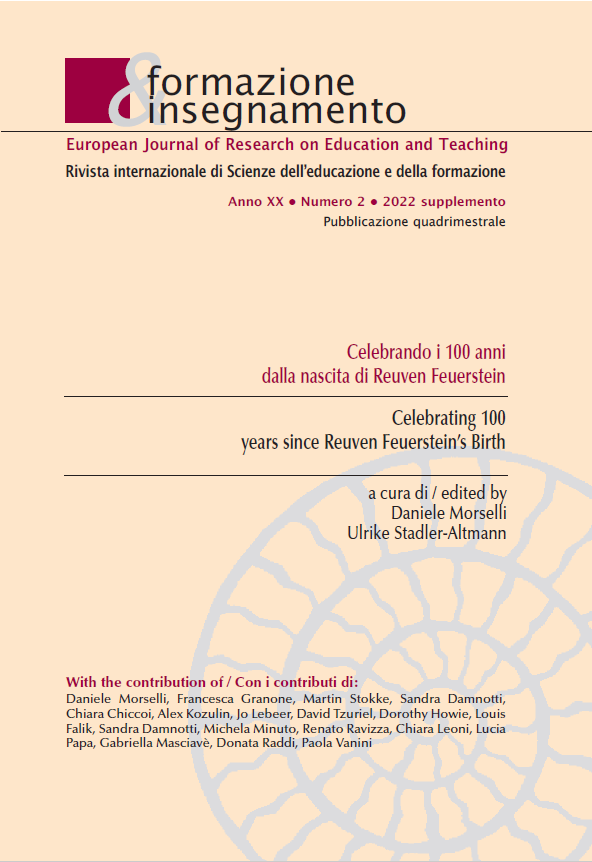The Relevance of Cognitive Aspects in the Educational Process in Primary School
DOI:
https://doi.org/10.7346/-feis-XX-02-22_09Keywords:
Inclusive education, Cognitive education, Feuerstein Instrumental Enrichment, Zone of Proximal Development, Cognitive functionsAbstract
An analysis of the current situation in Italian schools shows an increase in the number of students with special educational needs, in particular specific learning disabilities and students with other diverse types of dysfunctions, and also a significant growth in early school leaving. The scenario that emerges underlines the need to modify the educational dynamics, adapting them to the specific needs of each student. This article describes how constructs such as Vygotsky's Zones of Actual and Proximal Development and Feuerstein's cognitive functions can provide an extremely useful perspective for the analysis of the cognitive processes of each student, favoring a personalized approach to classroom work. In 2006, the European Parliament first introduced the concept of key competences. The fifth competence, "learning to learn", places the gradual development of students' fragile or deficient cognitive functions as one of the fundamental objectives of schooling. The thesis of the present article is that the use of Feuerstein's Instrumental Enrichment in class can provide an effective approach for the improvement of students' cognitive functions, which can later be generalized to disciplinary learning.
References
Commissione Europea (2019). Key competences for lifelong learning, Brussels: Publications Office of the European Union Retrieved from: https://data.europa.eu/doi/10.2766/291008
Commissione Europea (2006). Competenze chiave per l’apprendimento permanente. Un quadro di riferimento europeo. Retrieved from: https://op.europa.eu/it/publication-detail/-/publication/5719a044-b659-46de-b58b-606bc5b084c1/language-it/format-PDF/source-251390293
Cuzzato, M. & Papa, L. (2016). La lezione PAS come modello per costruire in classe un ambiente di apprendimento significativo e inclusivo. Orientamenti Pedagogici, 63, 3, 471-480.
Cuzzato, M. & Papa, L. (2020). Cosa posso imparare dalle prove INVALSI sull’apprendimento e sulla mia didattica? In P. Falzetti (Eds.), I dati INVALSI: uno strumento per la ricerca (Vol. 1, pp. 62-78). Milano: Franco Angeli.
Feuerstein, R., Feuerstein, R.S., Falik, L.H. & Rand Y. (2013). LPAD. Learning Propensity Assessment Device. Trento: Erickson.
Feuerstein, R., Feuerstein, R.S., Falik, L.H. & Rand, Y. (2008). Il Programma di Arricchimento Strumentale di Feuerstein. Fondamenti teorici e applicazioni pratiche. Trento: Erickson.
Invalsi Open, Le diseguaglianze che non si vedono senza dati per tutti, https://www.invalsiopen.it/leggere-diseguaglianze-dati/, 10 settembre 2021.
Papa, L., Cuzzato, M. & Clama, L. (2014). La mediazione efficace: una sperimentazione in classe sulla Pedagogia della Mediazione e il Programma di Arricchimento Strumentale (PAS) di R. Feuerstein. Formazione & Insegnamento, XII-4-2014, 329-349.
Piaget, J. (1967). Lo sviluppo mentale del bambino. Torino: Einaudi.
Seligman, M.E.P. (1972). Learned helplessness. Annual Review of Medicine, 23 (1), 407–412.
Tzuriel, D. (2004). La valutazione dinamica delle abilità cognitive. Trento: Erickson.
Universo Scuola, Istat, aumentano gli alunni con Bisogni Educativi Speciali a scuola: lo studio, https://www.universoscuola.it/istat-alunni-bes-indagine.htm, 30 dicembre 2020.
Vygotskij, L.S. (1987). Il processo cognitivo. Torino: Bollati Boringhieri.
Downloads
Published
How to Cite
Issue
Section
License
Copyright (c) 2022 Chiara Leoni, Lucia Papa

This work is licensed under a Creative Commons Attribution 4.0 International License.
Formazione & insegnamento is distributed under Attribution 4.0 International (CC BY 4.0).
For further details, please refer to our Repository & Archiving Policy, as well as our Copyright & Licensing Terms.





